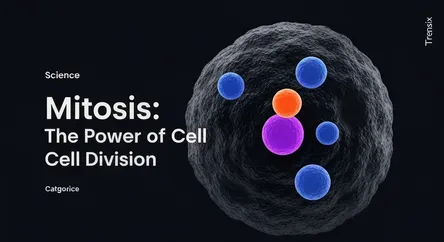Science
Mitosis: The Power of Cell Division

Discover mitosis, the fundamental process where one cell divides into two identical daughter cells. Learn why this is essential for growth and repair.
What is it?
Mitosis is a fundamental process of cell division in which a single cell divides into two genetically identical daughter cells. This process is crucial for the growth, development, and repair of multicellular organisms. It occurs in somatic (non-reproductive) cells and consists of four main stages: prophase, metaphase, anaphase, and telophase. During these phases, the cell's replicated chromosomes are meticulously separated and distributed into two new nuclei. The result is two cells with the exact same DNA as the parent cell, ensuring genetic stability across an organism's tissues.
Why is it trending?
Mitosis is a cornerstone of biology, constantly trending in educational and research circles. Recent interest is fueled by breakthroughs in cancer research, regenerative medicine, and aging studies, all of which hinge on understanding cell division. Advanced imaging technologies allow scientists to observe mitosis in unprecedented detail, while gene-editing tools like CRISPR offer new ways to study and manipulate the genes that control it. This ongoing research keeps mitosis at the forefront of scientific discovery.
How does it affect people?
Mitosis is essential to human life from the very beginning, enabling a single fertilized egg to develop into a complex being. On a daily basis, it facilitates growth, heals wounds by replacing damaged cells, and renews tissues like skin and the lining of the gut. However, when mitosis goes wrong and cell division becomes uncontrolled, it can lead to the formation of tumors and cancer. Consequently, many cancer therapies, such as chemotherapy, are designed to target and disrupt the process of mitosis in rapidly dividing cancer cells.